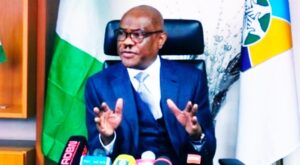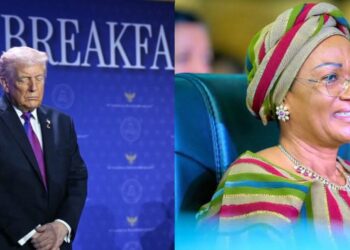Coalition or Defection? Wike's Clarification and the Politics of Political Mobility in Nigeria

By Ibrahim Kegbegbe
When Honourable Minister of the Federal Capital Territory, Nyesom Wike, addressed journalists during a media parley in Abuja on Monday, August 4, his remarks stretched beyond roads, bridges, and schools. He seized the opportunity to challenge what he perceived as a linguistic and political misdiagnosis — the media’s popular characterization of a supposed “coalition” among defecting political figures now pitching their tents with the African Democratic Congress (ADC).
According to Wike, what is being loosely termed a coalition is not a coalition in the truest political sense, but rather a series of individual defections — calculated moves by power-driven politicians seeking personal advantage ahead of the 2027 general elections. He cited the cases of former Vice President Atiku Abubakar, former Kaduna State Governor Nasir El-Rufai, former Labour Party presidential candidate Peter Obi, ex-Minister Rauf Aregbesola, and former PDP spokesperson Bolaji Abdullahi — all of whom have reportedly joined the ADC.
But Wike’s challenge to the “coalition” narrative deserves closer scrutiny. Is he merely nitpicking semantics, or is he drawing attention to a deeper dysfunction in Nigeria’s political culture?
The Politics of Words: Coalition vs. Defection
In political science, a coalition is a deliberate alliance among different political groups or parties to achieve a common goal, often ideological or policy-driven. Defection, on the other hand, is an individual’s act of abandoning one party for another — often for personal gain, electoral survival, or access to power.
From this perspective, Wike is technically correct. These politicians have not formally declared a unified front with a shared vision or political manifesto. There has been no formal merger or ideological alignment — merely a sequence of high-profile defections into a single party. These are not the actions of a coalition but rather the assembling of political hopefuls who see in ADC a fresh platform to contest for power, especially the presidency.
Wike’s argument is, therefore, a valid terminological correction — and one that demands deeper reflection on the health of Nigeria’s democracy.
READ ALSO:“I Rejected Billions to Rescue Ogun” — Ajadi Explodes as NNPP Backs Shofowora in Remo By-Election
A Carousel of Self-Interest
More critical than semantics is the question of motive. Wike accuses the defectors of being “power hustlers,” hopping from one party to another in a quest for political survival or relevance, rather than to advance the interests of the masses. He particularly highlighted Atiku Abubakar’s well-documented party-hopping — from PDP to ACN, back to PDP, to APC, back to PDP, and now reportedly to ADC.
This pattern reflects a deeper problem: the absence of ideological discipline and internal party democracy in Nigeria’s political system. Politicians often treat parties not as ideological homes, but as vehicles of convenience — to be boarded, alighted from, and re-boarded at will, depending on where the tide of political opportunity flows.
Such behavior undermines public trust in the political process. It fosters cynicism among the electorate, who see no difference between parties other than logos and slogans. If the same faces keep cycling through different platforms, all promising change, what is truly changing?
The Media’s Role: Watchdog or Echo Chamber?
Wike’s jab at the media also warrants attention. The press has a constitutional role as the fourth estate of the realm — to inform, interrogate, and interpret. In hastily labeling the ADC influx a “coalition,” parts of the media may have inadvertently conferred an aura of legitimacy and unity on what may merely be an opportunistic regrouping.
This is not to say the media must side with Wike, but to urge a more precise and analytical vocabulary in political reporting. Terms like “coalition” carry weight; they imply collaboration, planning, and ideology. If these are missing, journalists must call it what it is: defection, not alliance.
Wike’s Caution, Nigeria’s Political Reality
Wike’s remarks, while laced with political bias and perhaps aimed at weakening emerging competition, do reflect an important truth. Nigeria’s political actors often operate in a transactional space where loyalty is fluid, ideology is thin, and ambition trumps principle.
His insistence on calling recent moves “defections” may sound like word policing, but it also spotlights a critical need for political literacy — among journalists, citizens, and even politicians themselves.
READ ALSO:You Studied Animals, Not Journalism – Wike’s Aide Slams Rufai
As 2027 approaches, Nigerians must begin to demand not just new parties, but new principles. It is not enough to jump ships. The question is: what direction is the ship sailing — and who is it sailing for?
Ibrahim Kegbegbe is a journalist and public affairs analyst. He writes from Lagos.

















